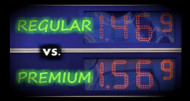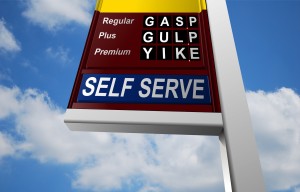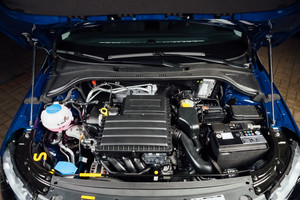Premium at a Premium: Dispelling the Myths Surrounding Gasoline Grades
By on Jan 09 2016

Oh, the misinformation...
If you've got the nice ride and the extra bills to go with it, it turns out that Premium Gasoline may not be so bad an investment, after all. Well ...for some.
Before the internet, people followed OEM specifications more readily. In 2015, it's a lot easier to stumble across a forum post regarding another guy driving the same —'98 Mercedes C-Class in midnight blue that you do. He writes, confidently:
Never, EVER use anything but premium gasoline in your '98 Mercedes C-Class. Your engine will take you further while staying cleaner, your gas mileage and acceleration will greatly improve, you will find a sudden boost in your overall feeling of well-being, your cholesterol will lower while your credit score skyrockets, and —your wife's cooking will suddenly begin to taste better.
 "Decisions, decisions...spend the extra $4 on a hot dog or premium gasoline?"
"Decisions, decisions...spend the extra $4 on a hot dog or premium gasoline?"
However, the next forum member responds:
Sorry, but, premium gasoline is waste of your time, money, and resources. Any benefits it provides are trivial. It provides the same energy output, it does not keep your engine cleaner, and your engine-life will not be increased. It also overstays its welcome and never cleans up after itself.
So who's correct?
Well — fortunately — neither of them are totally correct; however, aspects of both responses may be true.
As it turns out, whether or not premium gasoline will improve your vehicle's performance characteristics depends entirely on the make and model of your car.
According to a study conducted by Shell (and reiterated by industry expert Jason Fenske of howdoesacarwork.com), premium fuels showed increased performance characteristics in all five automobiles tested. These cars, all calling for premium gasoline, were of European (1), American (1), and Asian (3) origin — the study does not specify what specific cars were used for the study.
Though premium gasoline boosted performance across the board, the degree to which this was the case was variable. Fenske used a chart to better illustrate the divisive results:
To clarify, a red X indicates that there was no performance change between 87 (regular) and 91 (premium) fuel in that specific category. Under Acceleration Benefit, the blue numbers indicate the percentage decrease of ignition timing — the higher the percentage, the greater the effect premium fuel had on these engines, performance wise. The first column measures the acceleration from 5 — 80 mph, the second 5 — 40 mph, and the third, 40 — 80 mph.
The Exhaust Temp section of the graph indicates how well the premium fuel was able to reduce temperatures. The more significant the temperature reduction, the higher the rate of energy conservation. As you can see, the Euro vehicle had reduced exhaust temperatures by 16 degrees Celsius when operating at 65 miles per hour — that is 60 degrees Fahrenheit. Alternatively, the American car had no change whatsoever. Keep in mind, just because one American, European, or Asian car represents increased or decreased performance characteristics from the implementation of premium gas, this has no bearing on other vehicles manufactured in these respective locations.
What does this mean?
Performance changes resulting from implementing premium fuel in your vehicle depends almost exclusively on vehicle type but also on fuel quality and cleanliness. Keep in mind, though these numbers may look small, there is no telling how severely these increased performance characteristics will affect your vehicle in the long run. It could be a trivial amount, or it could save you thousands of hours and dollars.
Furthermore, considering every one of these vehicles benefited somewhat from implementing premium gasoline vs. regular, it is probably safe to say that when your vehicle recommends premium fuel, it is likely the best option. With that said, many would argue the performance benefits are inconsequential when considering the cost.
Cost?
Let's say premium costs 25 cents more per gallon, which some might say is being generous. Let's use gas prices from PSC's gas station in Northeastern Pennsylvania (Jan. 2016) as an example. If you fill your —18 gallon tank once a week with premium fuel for a year, you would be spending somewhere around $2,480 to refuel. Refueling with regular gas will cost around $1918, yearly. That's about a 25% difference.
Summary
- OEM specifications exist for a reason. Vehicles recommending Premium Fuel will likely benefit in some way from its use — however, the degree to which is variable.
- Some vehicles fare better than others. You have to use your judgement.
- Yes, your vehicle will run on clean, quality, and regular gasoline, even if it prefers premium. It is up to you to determine —which you will use.
- BOTTOM LINE? Intensive, make-and-model-specific testing needs to be done. Until then, it's on you to decide.
Check out Jason's website and channel here:







